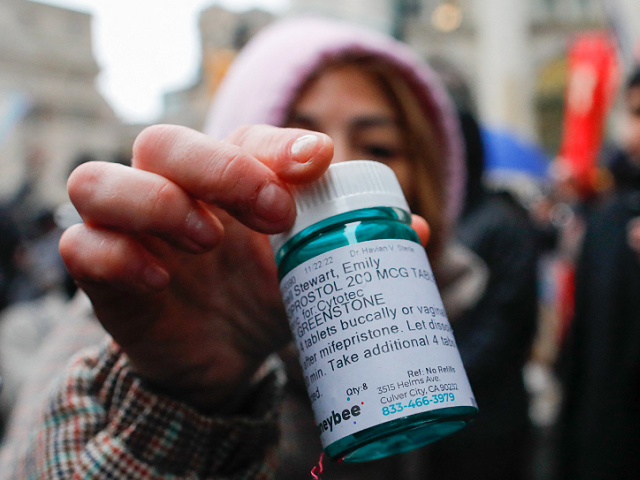Nearly 70 percent of women with a history of abortion describe their procedures as inconsistent with their own values and preferences, with one in four saying their abortions were unwanted or coerced, according to a peer-reviewed study published in the medical journal Cureus.
The study is the second of the Charlotte Lozier Institute’s “Unwanted Abortion Studies,” the first of which found that over 60 percent of women who had abortions report a high level of pressure to abort from one or more sources. Those same women also reported higher levels of mental health and quality-of-life issues following their abortions.
“This study confirms earlier findings that the hidden epidemic of unwanted abortions is real, and far larger than most people imagine,” said lead author David Reardon, Ph.D., a Lozier Institute associate scholar and director of the Elliot Institute.
Researchers for the study interviewed a sample of 1,000 women ages 41 to 45, and approximately 25 percent of those women reported a history of abortion and 91 percent completed the survey. That percentage is “almost three times the participation rate of the famous ‘Turnaway Study’ conducted by an abortion advocacy group, which purported to find almost universal satisfaction with the decision to abort, despite also finding high levels of regret, sadness, guilt and anger,” according to the press release announcing the study.

St Paul, Minnesota, Annual Pro life rally. The 2023 MCCL March for Life takes an opportunity to tell elected officials that unborn children and their mothers deserve better than no-limits abortion and won’t stop working until every innocent human being is protected. (Michael Siluk/UCG/Universal Images Group via Getty Images)
Reardon’s team set out to conduct a more nuanced assessment of women’s feelings and mental health outcomes following abortion, noting “negative and positive reactions frequently coexist.”
The study found 67 percent of women described their abortions as “accepted by inconsistent with their values and preferences (43 percent) or “unwanted or coerced (24 percent). Only 33 percent of respondents said their abortions were wanted.
The study additionally found that 54 percent of post-abortive women answered mostly affirmative to the statement that they would have continued their pregnancy if they had more financial security, and 42 percent said they would have given birth if they had more support from others. Sixty percent said they would have “preferred to give birth if they had received either more emotion support or had more financial security.”
“Both factors indicate that abortion is a marginal, or even unwanted, choice for most women. These findings are consistent with the results of other investigations reporting high rates of perceived pressure to abort and ambivalence regarding abortion decisions,” the study states.
Reardon said in a statement via email that the study shows “we need to discard the dangerous assumption that ‘freedom of choice’ reflects the reality behind most women’s experiences with abortion.”
“Only the minority of abortions are freely chosen absent outside pressures,” he added.

A pro-abortion activist displays abortion pills as she counter-protests during an anti-abortion demonstration on March 25, 2023 in New York City. (KENA BETANCUR/AFP via Getty)
The study concluded that only women who describe their abortion choice as wanted and consistent with their own values and preferences attributed any mental health benefits or a net gain in positive emotions to their abortions.
“All other groups attributed more negative emotions and a decline in mental health to their abortions. For these other groups, more social support, both from individuals and society, especially in terms of financial assistance, might empower those women who are at greatest risk of unwanted abortions to make choices more in line with their own personal values and preferences,” the study states.
The study’s authors noted a few limitations to their work. The authors suggest that the 9 percent drop-out rate in the study is “still four times higher than that of women without a history of abortion, suggesting that self-censure is likely to continue to bias results toward underreporting of negative effects even in prospective studies many years after exposure to an abortion.”
The authors continued:
Another limitation of our study is that Black women, low-income women, and lower educated women (groups who are likely at greater risk of feeling pressured to have an unwanted abortion) are also somewhat unrepresented when our sample is compared to the abortion rates of these groups reported elsewhere. This factor, too, suggests that our results may underestimate both the true rate of unwanted and coerced abortions and their associated negative outcomes.
Therefore, any projection of the rates of negative reactions and unwanted abortions on the national population are more likely to be underestimates than overestimates. In spite of these limitations, however, the correlations between the type of abortion decision and negative effects are likely to be accurate.
The authors said another limitation is that their data is both retrospective and limited to one point in time.
“Various perceptions may change, or conversely, harden over time. For example, just as victims of sexual abuse may only later recognize how they had been manipulated and abused, it is possible that some portion of the women in our sample who report that they were coerced into their abortions may have perceived their choice as freely made at that time,” they wrote.
Ultimately the authors suggested that more research be done to investigate the “factors involved in abortion decisions and how these interact with both positive and negative outcomes.”
“The finding that our simple four-point categorical scale for distinguishing between abortions that are freely wanted, accepted, unwanted, or coerced is strongly correlated with more positive or negative outcomes should be of special interest to mental health professionals and could be used as a starting point when called upon to advise pregnant patients on their abortion decisions,” they wrote. ” This scale could also be used as a guide to identifying issues that may need to be discussed when treating patients who are experiencing grief, guilt or other issues they attribute to their abortions.”
WATCH: Abortion Activists Literally BARK at Pro-Life Protester for Saying “You Weren’t Aborted”
Matt Perdie / Breitbart NewsTessa Longbons, Lozier’s senior research associate and a co-author of the study said in an emailed statement that “it’s time for a national conversation about abortion coercion that respects the range of women’s lived experiences…”
“We tend to think of abortion coercion in countries with oppressive regimes like China. In fact, this shocking hidden epidemic is happening all around us,” Longbons said. “Mail-order abortion pills remove the doctor from the room and make it easier than ever to force abortions on women and girls who do not want them – their distress compounded by the sight of their baby’s clearly human body. Countless women suffer in silence under the guise of ‘choice,’ when they never felt like they truly had one.”
“No woman should have to endure an unwanted abortion. This ought to be a point of common ground in the abortion debate. Instead, it is a rarely discussed third rail, even as pro-abortion politicians work to shut down the life-affirming safety net,” she continued. “It’s time for a national conversation about abortion coercion that respects the range of women’s lived experiences, while acknowledging that the overwhelming majority of abortions are in some degree of conflict with what women actually want. Their stories deserve to be told and not erased from the conversation.”

COMMENTS
Please let us know if you're having issues with commenting.